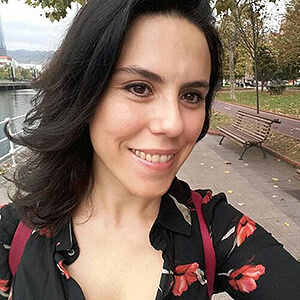
Ignacia Perugorría
CEIC Member, Member of the Consolidated Research Group- GAIT
Ignacia Perugorría is a researcher at the Center for the Study of Collective Identity, a lecturer in the Department of Sociology 2 and Social Work, and a PhD candidate in Models and Areas of Research in Social Sciences at the University of the Basque Country. Her thesis analyzes the interaction between social movement networks, identity battles, and politico-urban opportunity structures in the construction of what she calls “participatory culture” and “ephemeral cities”. She is a Fulbright scholar, an has also been awarded fellowships by the American Institute of International Education (IIE), and the Spanish Ministry of Economy, Industry and Competitiveness (MINECO). She has also been named “Basque Ambassador” by the Bizkaia Talent program. She received her M.A. in sociology from Rutgers University (USA) and her B.A. in sociology from the University of Buenos Aires (Argentina), both summa cum laude. She has taught undergraduate and graduate courses in Latin America as well as in the United States and Spain, and has participated in several research projects with Argentine, American and European funding. She is currently a member of the Consolidated Research Group of the Basque University System “Social Change, Emerging Forms of Subjectivity and Identity in Contemporary Societies” (GAIT, Gizarte Aldaketa Ikerketa Taldea; Type A; IT-1469-22 [GIC21/63]), and of the project “Building Sustainable Societies. Mobilization, Participation and Management of Socio-ecological Practices” (MINECO, PID2021-126611NB-I00). Her most recent publications include: From Indignation to Occupation: A New Wave of Global Mobilization (monographic issue of Current Sociology, edited with T. Benski, L. Langman and B. Tejerina, 2013), and the volumes Crisis and Social Mobilization in Contemporary Spain: The 15M Movement (2018, Routledge, The Mobilization Series on Social Movements, Protest and Culture), Global Movements, National Grievances. Mobilizing for ‘Real Democracy’ and Social Justice (2012), and From Social to Political. New forms of Mobilization and Democratization (2012), all of them co-edited with B. Tejerina. Her research interests lie at the intersection of culture, politics and the city, with a particular focus on urban commons, cultural activism and citizenship. She has recently embarked on a new line of research, together with Joseba García Martín, focused on the mobilization of civic organizations of the Spanish far right. Fruit of this collaboration are the academic articles “El campo antiderechos español frente a la Ley de Eutanasia. Repertorio movilizacional y trabajo identitario (2018-21),” published in the Revista Internacional de Sociología (RIS) and “Fighting Against Assisted Dying in Spain: Catholic-Inspired Civic Mobilization During the COVID-19 Pandemic,” accepted for publication in Politics & Religion (Cambridge University Press).
ignacia.perugorria@fulbrightmail.org
